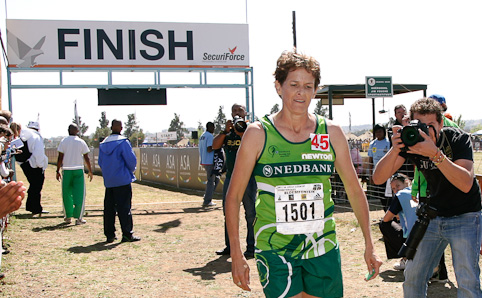|

|
Zola Budd
Photo: Johan Roux
|
According to Mr DB Prinsloo, Director of KovsieSport at our university, Athletics South Africa’s Cross Country-Championships, which was hosted on our Bloemfontein Campus, was a great success. Not only did a record number of 3 368 athletes register for the championships, but a record number of spectators – between 10 000 and 12 000 – also attended.
Well-known former Kovsie athlete, Zola Budd, who was the World Cross-Country Champion in 1985 and 1986, gave an outstanding performance at this event and triumphed as the overall winner in the 30-70 age group. What made her performance even more remarkable was her time of 14:37 in the 4 km race, which was faster than any of the girls in the 14-17 age group.
Kovsie student, Danel Prinsloo, also gave a good performance by finishing 6th out of 79 athletes in the junior women’s category. Danel, Charity Moletsane and Jessica Stevens (also from the UFS), won the bronze medal in the junior women’s team competition.
Khothatso Mokone obtained a 17th place (out of 70 athletes) in the senior men’s division. He also contributed to the Free State’s bronze medal in the 12 km team competition.
Other Kovsie athletes who contributed to the team competition medals for the Free State were Marili du Buisson, who won a bronze medal in the 4 km race for women under 21, and Maryna Swanepoel and Nelmaré Loubser, who both received bronze medals in the senior women’s 8 km race.
Danie Cronjé, former Kovsie and current Chairperson of the Kovsie Athletics Club, obtained a gold medal by winning the 8 km race for men aged 55-59 in a time of 30:37.